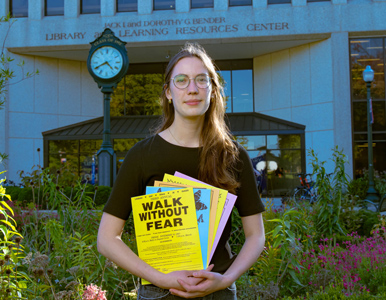
Emma Busch spent her senior year sifting through boxes of yellowed documents, handwritten meeting minutes, photographs, and news clippings chronicling the eight-year history of ENLACE—Washington’s first Latino/a gay and lesbian organization, founded in 1987 at the height of the AIDS crisis. Now, thanks to the sociology major’s efforts to digitize the collection, others can peruse the trailblazing nonprofit’s history for free with the click of a mouse.
Busch, CAS/BA ’22, met ENLACE’s former president, Letitia Gomez, last year through sociology professor Salvador Vidal-Ortiz. Gomez—one of ENLACE’s first members—planned to donate a hard copy of the organization’s records to the DC History Center as part of the Rainbow History Project, a grassroots effort dedicated to the collection and preservation of the local LGBTQ community’s history. Vidal-Ortiz and Busch wanted to make the materials more accessible by digitizing them in the AU Library’s archives and special collections. Their work underscores the university’s commitment to research and diversity and inclusion.
“I could write [countless] papers about the [work] of queer activists and artists of color, but those would never be read beyond my professor,” says Busch, who minored in transcultural studies. But digitizing ENLACE’s archive allowed the 23-year-old “to bring these stories into the institution and ‘cement’ them in [a permanent record].”
“I love storytelling, and when you view history through a queer lens of these communities, it adds a whole new dimension to DC’s [past],” Busch continues. As “gay White men seem to have the biggest place in [the LGBTQ movement’s] history,” one of the project’s aims is to shine a light on the “lack of Latino stories” amid the AIDS epidemic in the United States, from 1981 to the early ’90s.

The digitization project was funded by the Department of Sociology, AU Honors program, the library, and the Summer Scholars Program, which provides grant money to student researchers and their faculty mentors. The ENLACE collection is the library’s third dedicated to chronicling LGBTQ history. The others include an archival project led by philosophy professor Perry Zurn focused on the transgender experience at AU and Amelie Zurn’s Queer Health Activist Papers, which are currently being digitized.
“As stewards of archival and cultural heritage in Washington, DC, it is our vocation to preserve what is special about this city, to reveal the lived reality of the past, and show how our culture has changed,” says Leslie Nellis, head archivist for special collections and digital initiatives.
ENLACE celebrated Hispanic heritage and focused on issues related to the AIDS crisis and disenfranchisement. It collaborated with local organizations like SALUD, a nonprofit dedicated to HIV/AIDS education and prevention, and Whitman-Walker Health, a community health center specializing in LGBT health care.
“Through our existence, events, and activities, we made our Latino/a LGBT community visible to each other and to the greater Latino community,” says Gomez (pictured above, fourth from left, with Vincent Slatt, Busch, Vidal-Ortiz, and Anne McDonough at the DC History Center). “We showed Latino/a LGBT people that they could be proud of all [aspects] of who they were.”
Gomez says she was impressed with Busch’s enthusiasm and dedication to the work: “I was surprised that a young White woman was interested in organizing the archives of a queer Latinx organization.” And Vidal-Ortiz—who coedited with Gomez Queer Brown Voices, a 2015 collection of personal narratives from Latino/a activists—says his student’s tireless work ethic was instrumental to getting nearly 500 documents online in October.
“I never saw her doubt herself. She wanted this done and she wanted the collection available,” he says. “I don’t remember having a student who is so passionate about this kind of [archival] work.”